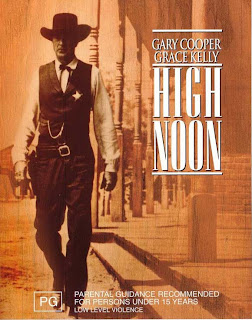In trudging through internet lists on the greatest Westerns of all time, certain titles start to feel embedded in the top ten. One begins to expect these titles to the point that if they do not show up, the list loses credibility. High Noon is one of those Westerns that judge the lists.
What distinguishes High Noon from other Westerns would be easy to explain if we were to distinguish it from Westerns that came before, but if we were to include what came after, it would pose an interesting challenge. High Noon is not different from a lot of Westerns precisely because it was emulated often. The stark, flat world became commonplace afterwards. Even the virtually cloudless skies became a consideration of future filmmakers.
Maybe the most important feature that embeds High Noon atop of any decent list is that the hero is not necessarily well-liked. In fact, High Noon is about a sheriff that cannot rally together a group of men to ward off the bad guys; a point worth considering in contrast to The Magnificent Seven which is about pulling a group together to do a job.
The film deserves more than genre appreciation, however. The music, for example, is the first noteworthy aspect of the film. In the opening credits, the film is silent other than the theme song and the effect is mesmerizing. The cinematography and editing are quality throughout. The looks down railroad tracks tell a story by themselves. The editing sequence when noon arrives is the perfect montage summary before we get the action we are waiting for. The way the clocks get bigger as noon approaches is also a nice touch along with how the movie takes place in about the same time it takes to watch.
The performances are also, for the most part, top notch. Gary Cooper won his only Academy Award for his role as Marshal Will Kane. Lloyd Bridges pulled off the reluctant coward well as Marshal Deputy Harvey Pell. Lon Chaney took a flat and direct approach and made sincerity of it. The most memorable performance, however, is Katy Jurado as Helen Ramirez. Speaking almost exclusively in enthymeme, she is both refined and forceful. Largely because of her compelling performance, Grace Kelly's role as Amy Kane felt dated and stereotypical. At one point, Helen tells Amy what it is like for a Mexican woman in the Old West, and if only to highlight naivety, Amy replies, "I understand." The scene where the churchgoers debate whether to help Kane also comes across as formulaic with everyone prefacing their thoughts with something like, "I can't believe what I'm hearing from you people."
In terms of great Westerns, High Noon is mandatory viewing. In terms of great films, wait for the right time. There is nothing so great about it that one's quality of life will lessen without seeing it. High Noon is simply one of those movies that deserve being watched when one is in the mood for a Western that will not disappoint.
IMDb rates this film 8.2 out of 10 (and number 7 in its list of greatest Westerns of all time)
Film 101 rates this film 5 stars out of 5 (in the honored red stars)
